KMS (Knowledge Management System)
What is a Knowledge Management System? A KMS is a platform used to capture, organise, and distribute knowledge and information within an organisation.
They can be an out-of-the-box solution or a Purpose Built Knowledge Management System. The main benefit of it being purpose-built is that it is tailored to your business and has the flexibility to grow with your business.
It ultimately serves as a centralised repository for information, expertise, and best practices, enabling users to access and share knowledge efficiently.
What is the Purpose of a Knowledge Management System?
The key purpose of a Knowledge Management System is to enhance organisational efficiency and effectiveness by capturing, preserving, and leveraging the collective knowledge of employees.
KMS helps in decision-making, problem solving and innovation within an organisation by providing easy access to relevant information and expertise.
It ultimately enables collaboration and knowledge-sharing across different teams, departments and locations, improving efficiency across the board.
What Are The Different Types of Knowledge Management Systems?
There are several different types of knowledge management systems, each with its own pros, cons and purposes:
Document Management Systems (DMS)
First of all, we have Document Management Systems. These systems focus on managing electronic documents such as text files, spreadsheets, presentations, and multimedia files. They provide features for:
- Version control
- Document storage
- Search capabilities
- Access permissions
With DMS, you can lock documents with a check-in and check-out process, meaning one person can edit a document without overriding another person’s changes. You can also roll back to a previous version of a document, which is ideal if you notice an error.
Knowledge Repositories
Knowledge repositories are universal databases that store a range of assets, such as:
- Documents
- Manuals
- Reports
- Best practices
They typically include features such as tagging, metadata management, and categorisation, making it easier to find relevant information across the board.
Collaboration Platforms
Collaboration platforms allow team members to communicate, collaborate and share knowledge through features such as discussion boards, blogs, and instant messaging. This, in turn, can promote collaboration and collective problem-solving, improving efficiency and teamwork.
Learning Management Systems (LMS)
LMS platforms focus on delivering and managing training and educational content for employees. They support:
- Online courses
- Assessments
- Certifications
- Tracking of learning progress
An LMS can ultimately provide a universal platform for delivering and organising content and monitoring progress and performance. They’re used by a range of industries, from office-based companies to those in the education sector. This can streamline onboarding and training, providing an efficient approach to learning.
Tacit, Implicit and Explicit Knowledge
There are three main types of information to gather when using a KMS - tacit, implicit and explicit knowledge.
Recognising these types of knowledge can help you to implement the right strategy to capture, store and distribute information effectively.
Tacit Knowledge
Tacit knowledge refers to knowledge that can be more difficult to articulate and share with others. This is because it comes from experiences, traits, intuition and insights. Because it is often subconscious, it can be difficult to formalise.
For example, a chef's ability to create a perfect dish typically relies on tacit knowledge - it can be difficult to share with others. However, a quality KMS can make this knowledge sharing easier.
Implicit Knowledge
Implicit knowledge is slightly more accessible than tacit knowledge. This type of knowledge involves information that can be expressed, but people may not be consciously aware of it.
Ultimately, it's knowledge that people possess and use without fully realising it. It’s something that’s not necessarily accessible consciously - such as learning to swim or riding a bike.
For example, implicit knowledge could be the ability to get around a certain neighbourhood without consciously thinking about the directions.
Explicit Knowledge
Explicit knowledge, on the other hand, is readily codified and documented. It can be easily communicated and shared through formal language, symbols, or numbers.
This type of knowledge could include manuals, databases, procedures, and other explicit forms of information.
Who Are Knowledge Management Systems For?
Knowledge Management Systems can benefit organisations of all sizes, across a range of different industries. For example:
- Large organisations looking to share knowledge across the board and improve organisation
- Small and medium-sized businesses looking to streamline internal processes and encourage collaboration
- Educational establishments looking for optimal knowledge sharing among students and staff
- Non-profit companies looking to organise and share insights and information
Why Do I Need a Knowledge Management System?
There are many benefits of knowledge management strategies to consider. First of all, a KMS can help to speed up training and onboarding. It can ensure that the right people have instant access to relevant information, and reduce the need for excessive training. It can ensure new employees are ready for the role quickly and efficiently.
A KMS can also lower customer service costs - it can make it easier for customer support or contact centre agents to find relevant and accurate information. This, in turn, can reduce average handling times, leading to optimal customer satisfaction and higher efficiency.
KMS also allows for easier and more streamlined collaboration and knowledge sharing. With an effective Knowledge Management System, employees can share and access insights, best practices and lessons learned, allowing for faster collective learning.
Additionally, if your organisation is prone to duplicate documents and redundant work, a KMS can centralise all resources and promote reuse. It can also make it easier to remove duplicated or irrelevant documents.
Some other reasons to consider a KMS include:
- A KMS encourages continuous improvement and innovation
- A KMS can support employee development and enhance their skills by making resources and training materials easily accessible
- A KMS can give your business a competitive advantage by allowing you to adapt and innovate faster
Why not consider our purpose-built knowledge management software at Max Contact?






